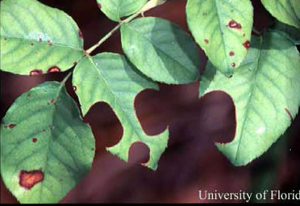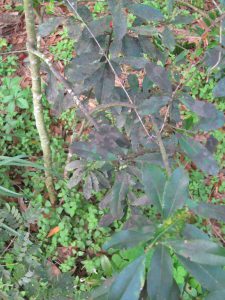Have you ever wondered how Master Gardener Volunteers figure out what’s wrong with a plant? We ask ourselves (or you) a series of questions before we start looking for the answer. You can ask yourself these questions, too. Being a plant detective is important to managing pests in your yard.

Of course, we start with a history of “the patient”. What kind of plant is it? Where does it live, and for how long? What are its food and water habits? Has the environment changed recently? Has anyone sprayed anything on it? Poured anything around its roots? Are its friends and relatives suffering from the same problem? How fast did the illness come on? How much of the plant is affected?
Then we ask about the symptoms – and here you can get out your detective hat and (more importantly) your magnifying glass. Sometimes, observing the behavior of an insect suspect can tell us a lot. If it’s running around, hunting for dinner – it might be a predator. If it’s sitting on the plant with its darned beak stuck in the plant – it might be a pest. But what if there is no obvious culprit? Then, the bite marks or other damage become important to note. If there’s a slime trail leading to the hole – you might have snails. If there are little nibbles around the edge – you might have beetles. If most of the leaf is gone – look for a caterpillar.
If there’s no physical damage and/or no insects, but the leaf is discolored or warped, it may be a fungal or disease problem. Many times the plant has a nutritional problem. Fertilizer questions are a little trickier, but thanks to UF/IFAS, we can look up individual species of plant and find out what our specialists recommend. And to make it even trickier, many times there are multiple things going on with the plant at the same time….a plant with a nutritional problem is in a weakened state and is now being attacked by a pest.

I volunteer at the Plant Clinic, and often as I ask these questions, the plant owner helps uncover the most likely cause for the plant’s issues. Remember, that the more information and detail you can provide, the better sleuthing we can do! It’s important to identify the issue with the plant before any action is taken! This can save money, reduce overuse of pesticides and fertilizers, and make sure the management action will actually solve the problem!
This blog post was written by Master Gardener Volunteer Celia Beamish here under supervision of the Master Gardener Volunteer Coordinator and Residential Horticulture Agent Anne Yasalonis.
For more information, contact UF/IFAS Extension Polk County at (863) 519-1041 or visit us online at http://sfyl.ifas.ufl.edu/polk. The Plant Clinic is open Monday-Friday, 9:00 am-4:00 pm to answer your gardening and landscaping questions. Visit us in person, give us a call, or email us at polkmg@ifas.ufl.edu.
If you are not in Polk County, Contact your local UF/IFAS Extension Master Gardener Volunteer Plant Clinic.
The Florida Master Gardener Volunteer Program is a volunteer-driven program that benefits UF/IFAS Extension and the citizens of Florida. The program extends the vision of the University of Florida/Institute of Food and Agricultural Sciences, all the while protecting and sustaining natural resources and environmental systems, enhancing the development of human resources, and improving the quality of human life through the development of knowledge in agricultural, human and natural resources and making that knowledge accessible.
An Equal Opportunity Institution.
 0
0
